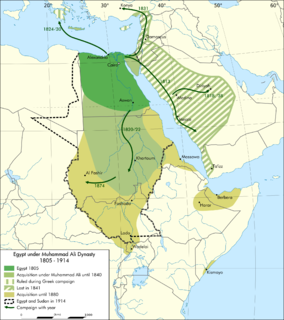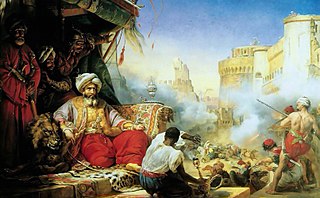 W
WThe Egyptian conquest of Sudan was a major military and technical feat. Fewer than 10,000 men set off from Egypt, but, with some local assistance, they were able to penetrate 1,500 km up the Nile River to the frontiers of Ethiopia, giving Egypt an empire as large as Western Europe.
 W
WThe history of Egypt under the British lasts from 1882, when it was occupied by British forces during the Anglo-Egyptian War, until 1956, when the last British forces withdrew in accordance with the Anglo-Egyptian agreement of 1954 after the Suez Crisis. The first period of British rule (1882–1914) is often called the "veiled protectorate". During this time the Khedivate of Egypt remained an autonomous province of the Ottoman Empire, and the British occupation had no legal basis but constituted a de facto protectorate over the country. Egypt was thus not part of the British Empire. This state of affairs lasted until 1914 when the Ottoman Empire joined the First World War on the side of the Central Powers and Britain declared a protectorate over Egypt. The ruling khedive was deposed and his successor, Hussein Kamel, compelled to declare himself Sultan of Egypt independent of the Ottomans in December 1914.
 W
WThe history of Egypt under the Muhammad Ali dynasty (1805–1953) spanned the later period of Ottoman Egypt, the Khedivate of Egypt under British patronage, and the nominally independent Sultanate of Egypt and Kingdom of Egypt, ending with the Revolution of 1952 and the formation of the Republic of Egypt.
 W
WThe Khedivate of Egypt was an autonomous tributary state of the Ottoman Empire, established and ruled by the Muhammad Ali Dynasty following the defeat and expulsion of Napoleon Bonaparte's forces which brought an end to the short-lived French occupation of Lower Egypt. The Khedivate of Egypt had also expanded to control present-day Sudan, South Sudan, Israel, Lebanon, Jordan, Syria, southern Turkey, and northwestern Saudi Arabia.
 W
WThe Kingdom of Egypt was the Egyptian state established under the Muhammad Ali dynasty in 1922 following the Unilateral Declaration of Egyptian Independence by the United Kingdom. Until the Anglo-Egyptian treaty of 1936, the Kingdom was only nominally independent, since the British retained control of foreign relations, communications, the military and the Anglo-Egyptian Sudan. Between 1936 and 1952, the British continued to maintain military presence and political advisers, at a reduced level.
 W
WThe process of Muhammad Ali's seizure of power in Egypt was a long three-way civil war between the Ottoman Turks, Egyptian Mamluks who had ruled Egypt for centuries, and Albanian mercenaries in the service of the Ottomans. It ended in victory for the Albanians led by Muhammad Ali of Egypt (1769–1849).
 W
WThe Sultanate of Egypt was the short-lived protectorate that the United Kingdom imposed over Egypt between 1914 and 1922.
 W
WThe Ottoman-Saudi War was fought from early 1811 to 1818, between Egypt Eyalet under the reign of Muhammad Ali Pasha and the army of the Emirate of Diriyah, the First Saudi State, resulting in the destruction of the latter.